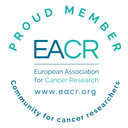Systemic inflammation, as measured by the neutrophil/lymphocyte ratio, may have differential prognostic impact before and during treatment with fluorouracil, irinotecan and bevacizumab in metastatic colorectal cancer patients.
Parole chiave
Astratto
The inflammatory index neutrophil/lymphocyte ratio (NLR) has an adverse prognostic value in patients with localized colorectal cancer (CRC). We aimed at evaluating its role in metastatic CRC (mCRC) patients treated with standard first-line chemotherapy. Among consecutive CRC patients referred to our Unit, those with metastatic disease eligible for treatment with fluorouracil, irinotecan and bevacizumab (FOLFIRI-Bev) were included in the study. NLR was routinely assessed before each treatment cycle and correlated with outcome together with common clinical, biochemical and histological variables. A sub-analysis focused on patients with stable disease (SD) was also performed to test the net influence of NLR changes independently of tumor shrinkage. At multivariate Cox regression analysis, baseline NLR, taken as continuous variable, was the most powerful prognosticator for survival (HR 1.80, p 0.0019). Surprisingly, among SD patients, the prognostic effect of NLR changes after two cycles of therapy was of opposite sign, and those in whom NLR increased or was maintained had a 67 % reduction in the risk of death as compared with patients with significant NLR decrease: mOS 56 versus 23 months, respectively, p 0.02. In conclusion, we were able to confirm the adverse prognostic value of high baseline NLR for mCRC patients treated with FOLFIRI-Bev. However, FOLFIRI-Bev-induced NLR changes in SD patients seem to differently affect survival. The specific molecular pathways involved in NLR modulation by FOLFIRI-Bev warrant further investigation.




